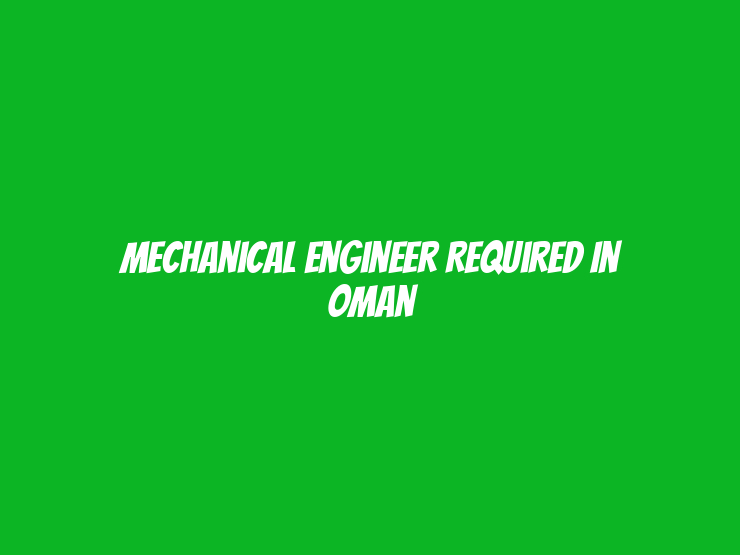A Mechanical Engineer is responsible for designing, developing, and testing mechanical devices, including tools, engines, machines, and other mechanical systems. They apply principles of physics and materials science to ensure that mechanical systems perform efficiently and reliably. Mechanical engineers work across various industries, including automotive, aerospace, energy, manufacturing, and construction. They often collaborate with other engineers, technicians, and professionals to bring concepts from the design phase through to production and implementation.
Dua for Job Seeking: اللهم يسر ولا تعسر واكمل ولا تكل وبارك لي فيما قَدَّرت
| Salary | ₹80,000 – ₹100,000 ($961 – $1,201) |
| Experience | 5 – 10 years |
| Location | Oman |
| Qualification | Bachelor of Technology/Engineering(Mechanical) |
| Posted | 09 October 2024 |
| Job Type | Full-Time |
| Posted by | Habeebi Recruiter |
| last date to apply | apply within 15 days of posting |
Key Responsibilities
1. Design and Development
Mechanical engineers are tasked with creating new designs or improving existing mechanical systems. They use computer-aided design (CAD) software to create detailed plans and specifications for components and systems. This process involves considering factors such as functionality, cost-effectiveness, safety, and durability. Mechanical engineers must ensure that the designs meet industry standards and regulatory requirements.
2. Testing and Analysis
Once a design is completed, mechanical engineers oversee the testing phase to ensure the system works as intended. They are responsible for conducting stress tests, simulations, and real-world trials to assess performance. Based on the test results, they may need to modify designs or suggest improvements to meet performance targets or address any identified issues.
3. Project Management
Mechanical engineers often manage projects from conception through to completion. This includes planning the project timeline, overseeing the procurement of materials, and ensuring that the project stays within budget. Engineers must coordinate with other teams, such as electrical or software engineering, to integrate various system components effectively.
4. Research and Innovation
Mechanical engineers play a vital role in researching new technologies and methods to improve mechanical systems. They stay updated with advancements in the field and apply this knowledge to develop innovative solutions for current and future challenges. Whether it’s exploring alternative materials or refining energy-efficient systems, mechanical engineers are at the forefront of technological progress.
5. Maintenance and Troubleshooting
In industries such as manufacturing and energy, mechanical engineers are involved in maintaining existing systems and equipment. They diagnose mechanical failures, identify root causes, and implement effective repair or replacement strategies. This responsibility ensures continuous, efficient operation of machinery and systems, minimizing downtime and operational costs.
6. Collaboration and Communication
Mechanical engineers work closely with a variety of stakeholders, including clients, other engineers, production teams, and external contractors. Effective communication is essential to ensure that project requirements are understood and that technical details are conveyed accurately. Collaboration also plays a key role in multidisciplinary projects, where mechanical engineers must integrate their work with other engineering disciplines.
7. Regulatory Compliance
Mechanical engineers must ensure that all designs, products, and systems comply with relevant industry standards, laws, and regulations. This may involve consulting regulatory guidelines, obtaining necessary certifications, and ensuring that products meet safety, environmental, and performance standards.
Skills and Qualifications
Mechanical engineers need a strong foundation in engineering principles, particularly mechanics, thermodynamics, and materials science. Proficiency with design software (e.g., AutoCAD, SolidWorks) is essential, as is a working knowledge of data analysis tools and manufacturing processes. Excellent problem-solving skills, attention to detail, and the ability to work in a team environment are also crucial for success in this role.
A bachelor’s degree in mechanical engineering or a related field is typically required, and many roles may also require professional certification, such as a Professional Engineer (PE) license. Continuous professional development is encouraged to stay current with technological advancements and industry trends.
How to apply:
Send your updated resume to our email or directly reach us at our phone:
Email: info@divinoman.com
Telephone: +23292698
Disclaimer:
- We list jobs submitted by employers. HabeebiRecruiter.com does not verify employers or guarantee job details.
- Be aware: legitimate jobs never require upfront payment
